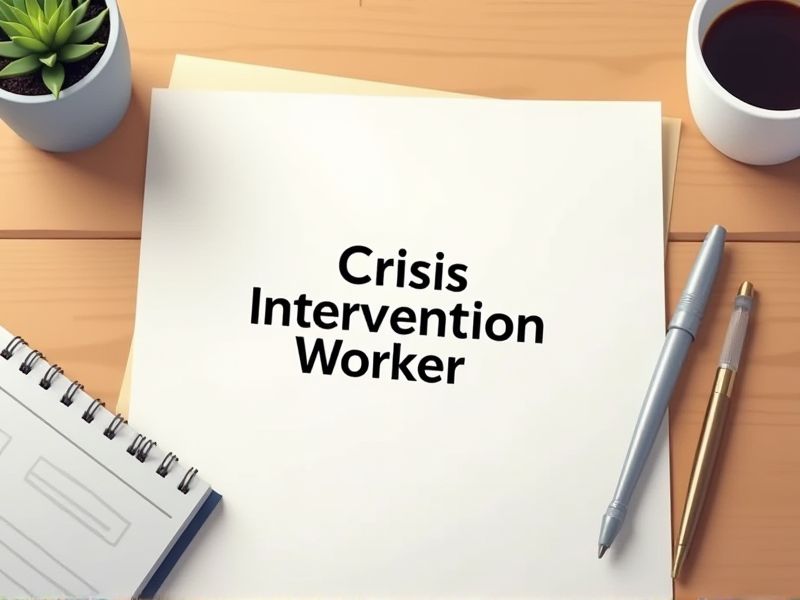
A Crisis Intervention Worker deals with individuals in high-stress situations, which demands specific skills and knowledge to ensure effective support. Obtaining certain certifications provides validation of the professional's ability to handle emotional and psychological distress. Training through these certifications enhances the worker's capacity to respond adeptly to crises, ensuring safety and appropriate care for individuals in need. Below are several key certifications that are essential for Crisis Intervention Workers.
Crisis Intervention Training Certification
Crisis Intervention Training Certification equips workers with essential skills to effectively manage and de-escalate high-stress situations. Without proper certification, intervention workers may lack the necessary techniques to ensure safety for themselves and the individuals in crisis. Certification provides professionals with an understanding of mental health issues, improving intervention outcomes. Accreditation ensures that workers are consistently updated with best practices in crisis response.
Mental Health First Aid Certification
Crisis intervention workers often encounter individuals experiencing acute psychological distress, and a Mental Health First Aid Certification provides essential skills to assist effectively. Without this training, recognizing symptoms of mental health disorders may be challenging, leading to inadequate support. Certification equips workers with strategies to de-escalate situations safely, which can prevent harm and ensure appropriate referrals. This specialized training increases worker confidence and competence, fostering better outcomes for individuals in crisis.
Applied Suicide Intervention Skills Training (ASIST)
The prevalence of mental health crises requires crisis intervention workers to be equipped with effective strategies, making ASIST vital for skillful suicide prevention. ASIST provides practical training for identifying and addressing immediate risks of suicide, fostering enhanced safety planning. Crisis intervention workers trained in ASIST are better prepared to establish trust and communicate effectively in high-stress situations. By participating in ASIST, workers gain essential skills to confidently support individuals in distress, potentially reducing suicide rates in communities.
Certified Crisis Intervention Specialist
Certified Crisis Intervention Specialists provide proven expertise, ensuring effective communication and de-escalation tactics during crises. Their certification enhances the credibility of intervention efforts, demonstrating specialized training in handling high-stress situations. They maintain updated knowledge on best practices, meeting evolving standards in crisis management. Their presence can reduce potential harm, leading to better outcomes for individuals and communities in distress.
Trauma-Informed Care Certification
Having a Trauma-Informed Care Certification equips crisis intervention workers with the knowledge to recognize signs of trauma, which enables more effective and sensitive responses to individuals in crisis. This certification improves the worker's ability to create a safer environment for clients by understanding the pervasive impact of trauma on behavior and mental health. With this knowledge, workers can tailor their intervention strategies to avoid re-traumatizing individuals, thereby improving outcomes. The certification also fosters trust and collaboration between workers and clients, essential for successful crisis resolution.
De-escalation Techniques Certification
Crisis intervention workers often encounter volatile situations where de-escalation techniques help prevent harm and maintain safety. Certification in these techniques ensures workers are equipped with structured strategies to diffuse tension and manage dynamics effectively. Empirical data suggests that trained workers are more likely to reduce the risk of escalation, leading to better outcomes. Organizations can reduce liability and improve service quality by ensuring their workers hold such certifications.
Substance Abuse Counseling Certification
Substance abuse counseling certification equips crisis intervention workers with specialized knowledge to identify and address substance-related issues, enhancing their effectiveness in critical situations. This certification ensures that workers are adept at recognizing signs of addiction, which is crucial for timely and appropriate intervention. Certified workers are often better at developing tailored strategies that support recovery and ensure long-term stability for affected individuals. Employers frequently seek certified professionals, as this indicates a higher standard of training and competence in handling complex cases involving substance abuse.
Certified Peer Support Specialist
Certified Peer Support Specialists bring lived experience to crisis intervention, which can enhance empathy and understanding in high-stress situations. Their presence often helps to build trust quickly with individuals experiencing a crisis, potentially leading to more effective de-escalation. The insights and shared experiences of Peer Support Specialists can offer unique perspectives that clinical training alone might not provide. Integrating Peer Support Specialists into crisis teams can reduce reliance on emergency services and improve overall mental health outcomes.
Emergency Management Certification
Emergency Management Certification equips crisis intervention workers with the essential skills and knowledge to effectively respond to and manage emergencies. This certification ensures workers are well-versed in best practices, enhancing their ability to coordinate with first responders and other emergency services. With this credential, crisis intervention workers can better assess risk scenarios and implement strategic action plans to mitigate further harm. Certification also increases credibility and trust among communities relying on their expertise during crises.
Conflict Resolution and Mediation Certification
Conflict resolution and mediation certification equips crisis intervention workers with structured techniques to de-escalate potentially volatile situations, ensuring safety for all involved. This training enhances communication skills critical for understanding and addressing the needs of individuals in crisis. Certified workers are more adept at fostering cooperation and empathy, which leads to more effective and sustainable solutions. The certification also builds credibility and trust with clients and stakeholders, improving overall intervention outcomes.
Summary
By pursuing certifications, you enhance your skills and credibility as a Crisis Intervention Worker. The additional training equips you with advanced techniques, improving your ability to manage high-stress situations effectively. This enhanced competency typically leads to better intervention outcomes and increased client trust. Employers often recognize certified professionals with career advancement opportunities and higher earning potential.
